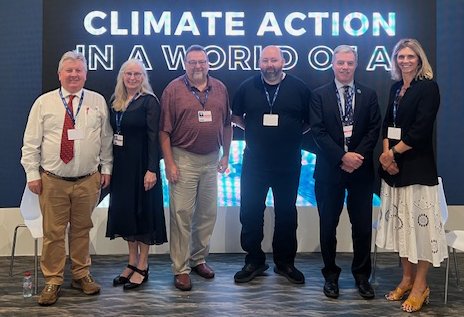
Supporting countries, institutions and the public in achieving their sustainable development goals.
EAGLES 2030 at COP-28 (Dubai)
On 11 December 2023, EAGLES 2030 held two side events at COP-28. The events took place in the Ukrainian Pavilion and we were kindly hosted by the National Ecological Centre of Ukraine - NECU. More information about the presenters and topics are in the links below.
EAGLEs 2030 conducts global presentation at COP-28, hosted by the National Ecological Center of Ukraine.
EAGLEs 2030 presenters at COP-28.
Each UN Member State is tasked with implementing the 2030 Agenda.
The Expert Action Group Leading Environmental Sustainability (EAGLES 2030) strengthens national and regional capacities to implement the environmental dimension of RIO+20 Outcomes, the 2030 Agenda, and Paris COP Agreement and other international conventions.
Sustainable Development Goals
“The Sustainable Development Goals are the blueprint to achieve a better and more sustainable future for all. They address the global challenges we face, including those related to poverty, inequality, climate change, environmental degradation, peace and justice. The 17 Goals are all interconnected, and in order to leave no one behind, it is important that we achieve them all by 2030.”
The United Nations
There are 17 goals, 169 targets and 232 indicators that make up the Sustainable Development Goals (SDGs) … read more
THE GLOBAL GOALS
For Sustainable Development

We are internationally experienced professionals providing solutions to environmentally sustainable development issues.
EAGLES 2030 strategic approaches
We focus on the environmental dimensions of the 2030 Agenda and its Sustainable Development Goals. Below are the strategic approaches of Agenda 2030 we are adopting to support achieving the SDGs.
Leave no-one behind.
The SDGs are inclusive. The goals and targets of Agenda 2030 should be met for all nations, people and segments of society. Those who are furthest behind are the first to be reached.
Transformational change.
Agenda 2030 calls for transformations in viewing and doing development. We need deep and profound transformations to make a shift in the dominant culture or philosophy and transform the social, territorial, and fiscal policies. The transformation requires designing a sound mix of transformative policies and balancing short-term and long-term considerations. Countries are to create roadmaps and strategies to achieve the SDGs.
Mainstreaming.
The successful implementation of the Sustainable Development Goals necessitates mainstreaming the SDGs into national policies, plans and strategies., including these eight practice areas:
Raising Public Awareness
Applying Multi-stakeholder Approaches
Adapting SDGs to National, Sub-national and Local Contexts
Creating Horizontal Policy Coherence
Reviewing Plans and Adapting the SDGs to National Contexts
Monitoring, Reporting and Accountability
Financing and Budgeting for the Future
Assessing Risk and Fostering Adaptability
Enabling environment.
Achieving the SDGs involves the creation of the enabling conditions for things to happen. Those conditions include:
Institutional setup for coordination and collaboration
Legal frameworks
Sound policies
Incentives for stakeholder engagement
Participatory governance
Capacity mobilization and strengthening
Investment incentives and access to finance
Awareness and communication
Data and information
Technologies
EAGLES 2030 is well positioned to support the development of the enabling environment.
Interlinkages and nexuses.
The SDGs are complex with interlinkages between the goals and targets. For example, the implementation of the SDGs comes with an increased demand for natural resources. A better understanding of resource interlinkages will help to implement the SDGs in an unprecedented integration. One action on a specific issue will have implications for other issues. Knowing the interlinkages between the issues will allow better synergies and reduce trade-offs for integrated policymaking.
Coalitions and alliances.
The collective capacity, the one voice, and the coordinated actions of Coalitions and alliances offer empowerment and provide strength required for the implementation of SDGs. This power allows crossing boundaries, overcoming barriers of bureaucracy, and bringing issues to the public domain. Coalitions and alliances which bring together various stakeholders with governments could provide a holistic and comprehensive approach for successful implementation of the SDGs.
Tradeoffs.
Actions on some SDGs may affect other SDGs positively or negatively. When implementing the SDGs, we need to consider the synergies and the trade-offs needed to make balanced decisions. Conflict in implementing the SDGs may occur when one target more intensively uses resources necessary for the achievement of another target. According to the UN, at least 60 SDG targets have explicit connection to at least one other goal. Further, seven targets across four of the SDGs connect to more than ten other goals.
Synergies.
Realising the SDGs is not possible without understanding and acting on the synergies and trade-offs between them. Interactions among the 17 SDGs and the 169 targets can have positive or negative effects. The positive effects on sustainable development and achieving the agenda 2030 would be considered ‘synergies’. Governments need to have mechanisms to ensure synergies and trade-offs receive collective and systematic attention.












